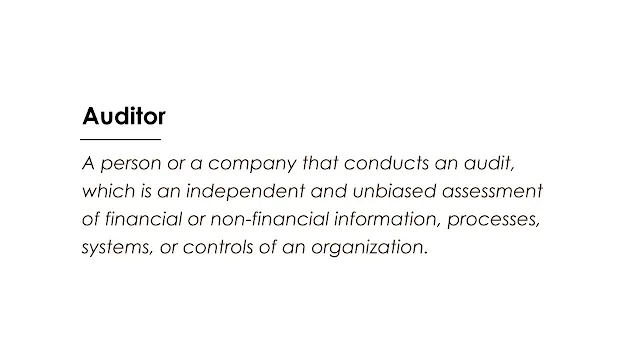 |
| Image: Moneybestpal.com |
The term "auditor" refers to a person or a company that conducts an audit, which is an independent and unbiased assessment of financial or non-financial information, processes, systems, or controls of an organization.
An audit's goal is to offer assurance, an opinion, or a recommendation regarding the subject matter's accuracy, completeness, dependability, or compliance.
There are different types of auditors, depending on the scope, nature, and objective of the audit. Some of the common types are:
External auditors
In order to audit a firm's financial accounts or other areas of its operations, a company or its stakeholders may retain independent third-party consultants. They express a judgment on whether the financial statements give an accurate and fair picture of the company's financial situation and performance while adhering to generally accepted auditing standards (GAAS). Furthermore, they point out any significant inaccuracies, mistakes, fraud, or disregard for legal and regulatory requirements.
Internal auditors
Workers who assess a company's internal controls, risk management, governance, and operational effectiveness in a neutral and unbiased manner. They adhere to the requirements set forth by the Institute of Internal Auditors (IIA) and present the audit committee or management with their conclusions and suggestions. They help with both putting in place corrective measures and assessing how well they work.
Government auditors
Representatives of the public who look into and preserve the records of organizations that receive public monies from the government. They adhere to the guidelines established by the GAO or other pertinent agencies and inform Congress or other oversight organizations of their findings. Additionally, they guarantee that government agencies follow the law, rules, and spending plans.
Forensic auditors
Investigations into fraud, corruption, embezzlement, money laundering, and other financial crimes are carried out by these forensic accounting experts. They employ a variety of auditing and investigation approaches to gather data, track transactions, find offenders, estimate damages, and support legal actions. Furthermore, they offer specialized testimony in arbitration or court.
The role and responsibilities of an auditor vary depending on the type of audit and the subject matter. However, some of the common duties and responsibilities of an auditor are:
- Planning and preparing for the audit: As part of this, the audit's scope, objectives, criteria, and methodology must be established. Additionally, the audit team must be chosen, pertinent data and documents must be obtained, a risk assessment must be conducted, audit procedures must be developed, and audit activities must be scheduled.
- Performing the audit: It entails carrying out the audit procedures, gathering and analyzing data, testing samples, watching processes, interviewing staff, confirming records, detecting issues, assessing evidence, and recording results.
- Reporting the audit: Summarizing the findings, formulating an opinion or conclusion, formulating recommendations, informing the auditee or other stakeholders of the findings, releasing an audit report, and monitoring corrective measures are all part of this process.
To perform their role effectively, auditors need to have certain skills and competencies. Some of the essential skills for auditors are:
- Technical skills: Accounting fundamentals, auditing standards, financial reporting frameworks, rules and regulations, business practices, information systems, data analysis tools, etc. are all things that auditors need to be familiar with.
- Analytical skills: Auditors must possess the skills necessary to critically analyze data, spot patterns and abnormalities, come to logical conclusions, come up with original solutions to problems, etc.
- Communication skills: The ability to communicate both orally and in writing in a clear, succinct, professional, and persuasive manner is a must for auditors. To effectively communicate with other people, they also need to have good listening and interpersonal skills.
- Ethical skills: High criteria for professionalism, objectivity, independence, confidentiality, and integrity must be met by auditors. Additionally, they must abide by the moral standards established by the organizations or professional bodies they belong to.
The integrity and dependability of an organization's financial or non-financial information, procedures, systems, or controls are largely dependent on the effectiveness of its auditing department. In order to improve business performance, manage risks, stop fraud, ensure compliance, and give assurance to numerous stakeholders, auditors are crucial.
